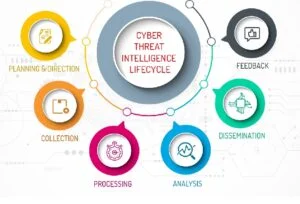How can organisations stay ahead of increasingly sophisticated cyber threats? Traditional defences are no longer sufficient to protect sensitive data and maintain network security. To effectively counter these threats, organisations must adopt a proactive technique that anticipates and mitigates risks before they cause harm. This is where threat intelligence comes into play.
When integrated into cyber security services, threat intelligence provides a detailed understanding of potential threats, allowing organisations to defend against them preemptively. By leveraging data and insights from various sources, companies can make informed decisions and fortify their defences. This page explores the significance of threat intelligence and how it enhances businesses’ overall security posture.
Enhancing Proactive Defense
One of the primary benefits is its ability to transform strategies from reactive to proactive. Businesses can use intelligence to predict and prevent attacks instead of simply responding to attacks after they occur. This proactive approach enables organisations to stay ahead of cybercriminals by identifying and mitigating vulnerabilities before they can be exploited.
Informed Decision-Making
It empowers teams to make informed decisions based on real-time data. By understanding cyber attackers’ tactics, techniques, and procedures (TTPs), organisations can prioritise their security efforts where they are most needed. This ensures that resources are assigned efficiently and the most critical dangers are promptly addressed.
Reducing Response Time
In the event of a security violation, time is of the essence. Detailed information on the nature of the attack and its potential impact on the organisation helps reduce response time. With this knowledge, security teams can quickly contain and remediate the threat, minimising damage and disruption.
Strengthening Incident Response Plans
Incident response plans are essential for minimising the impact of a security breach. It enhances these plans by providing insights into the latest threats and attack vectors. This allows organisations to continuously update and refine their response strategies, ensuring they are prepared for any eventuality.
Improving Vulnerability Management
Vulnerability management is a crucial feature of any security strategy. It contributes to this process by identifying emerging vulnerabilities that may not yet be widely known. By staying informed about these weaknesses, organisations can patch or mitigate them before attackers exploit them.
Collaborative Defense Efforts
Sharing threat intelligence with other organisations and industry groups is an effective way to enhance collective security. By participating in information-sharing networks, businesses can benefit from their peers’ collective knowledge and experience. This collaborative approach aids in creating a more robust, resilient defence against cyber threats.
Supporting Regulatory Compliance
Regulatory compliance is a significant concern in many industries, especially regarding data protection and privacy. It plays a vital role in assisting organisations to meet these compliance requirements. Businesses can ensure they adhere to industry standards and legal obligations by providing detailed insights into potential risks and vulnerabilities. This reduces the chance of costly fines and penalties and builds trust with customers and stakeholders by demonstrating a commitment to sturdy security practices.
Enhancing Security Awareness and Training
The human factor is an often overlooked but crucial aspect of a strong security posture. It can significantly enhance security awareness and training programs within an organisation. By incorporating real-world examples, employees can be better prepared to recognise and respond. This reduces the likelihood of thriving attacks and fosters a culture of alertness and responsibility among staff, further strengthening the organisation’s security defences.
Integrating threat intelligence into cyber security services is essential for staying ahead of ever-evolving threats. In an era of constantly changing cyber dangers, having a robust threat intelligence program is no longer optional. It’s necessary to safeguard digital assets and ensure continuity of business operations.
Also read about: Ultimate Guide to Hyperbaric Oxygen Therapy







